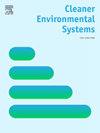Social Life Cycle Assessment (S-LCA) of formal and informal waste collectors in decentralized waste to compost facility
IF 4.9
Q2 ENGINEERING, ENVIRONMENTAL
引用次数: 0
Abstract
The global generation of municipal solid waste (MSW) is expected to increase by 70 % by 2050, reaching 3.4 billion metric tons. Despite the need for proper waste management, less than 20 % of waste is recycled, and waste continues to end up in landfills. Waste management is a significant problem in Bangladesh and other rapidly urbanizing nations, exacerbated by densely populated housing coupled with inadequate infrastructure. The utilization of informal waste collectors arises from the government's frequent inability to offer sufficient waste collection and disposal services. A large number of Dhaka's informal sector workers depend on collecting waste for a living. In this study, the social life cycle assessment (S-LCA) is applied to analyze the social implications of formal and informal waste collectors on the waste management process in Uttara, Dhaka. Working conditions, human rights, health and safety, and socio-economic repercussions are the four primary areas of focus for the S-LCA. For the assessment, an indicator score ranging from 2 (best performance) to −2 (poor performance) was used. The data revealed that informal workers scored 0 for fair salaries, but formal workers received 1, showing that formal workers adhere to higher standards. Both groups obtained an average score of −2 in the social security subcategory, which is much lower than anticipated. Formal workers scored −2 on health and safety, while informal workers scored −1, indicating serious inadequacies in both categories. These findings highlight the need for stronger legislation and support systems to enhance waste collectors' working conditions in Dhaka and other similar cities throughout the world, as well as the considerable socioeconomic challenges they confront.
分散式废物堆肥设施中正式和非正式废物收集者的社会生命周期评估(S-LCA)
到2050年,全球城市固体废物(MSW)的产生量预计将增加70%,达到34亿吨。尽管需要适当的废物管理,但只有不到20%的废物被循环再造,废物继续被送往堆填区。在孟加拉国和其他快速城市化的国家,废物管理是一个重大问题,人口密集的住房加上基础设施不足加剧了这一问题。由于政府经常无法提供足够的废物收集和处理服务,因此利用非正规废物收集者。达卡大量非正规部门的工人依靠收集废物为生。在这项研究中,社会生命周期评估(S-LCA)应用于分析正式和非正式废物收集者对达卡乌塔拉废物管理过程的社会影响。工作条件、人权、健康和安全以及社会经济影响是《南- lca》的四个主要重点领域。对于评估,指标得分范围从2(最佳性能)到- 2(最差性能)。数据显示,非正式工人在公平工资方面得分为0,而正式工人得分为1,表明正式工人坚持更高的标准。两组在社会保障子类别的平均得分均为- 2,远低于预期。正式工人在健康和安全方面得分为- 2,而非正式工人得分为- 1,表明这两个类别都严重不足。这些调查结果突出表明,需要加强立法和支持系统,以改善达卡和世界其他类似城市的废物收集者的工作条件,以及他们面临的巨大社会经济挑战。
本文章由计算机程序翻译,如有差异,请以英文原文为准。
求助全文
约1分钟内获得全文
求助全文
来源期刊

Cleaner Environmental Systems
Environmental Science-Environmental Science (miscellaneous)
CiteScore
7.80
自引率
0.00%
发文量
32
审稿时长
52 days
 求助内容:
求助内容: 应助结果提醒方式:
应助结果提醒方式:


